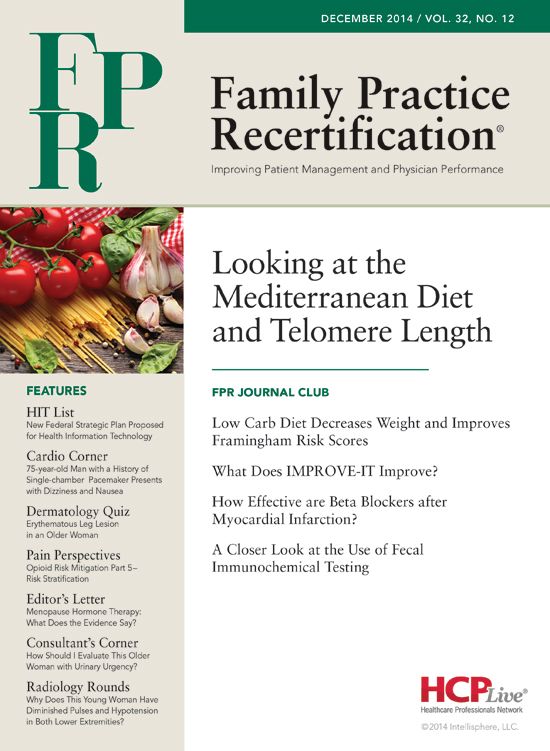Publication
Article
Family Practice Recertification
Low Carb Diet Decreases Weight and Improves Framingham Risk Scores
Author(s):
Eating a low carbohydrate diet compared to a low fat diet leads to greater loss of weight as well as a significant reduction in Framingham Risk Score.

Frank J. Domino, MD
Review
Effects of Low-Carbohydrate and Low-Fat Diets: A Randomized Trial: Lydia A. Bazzano, MD, PhD, MPH*; Tian Hu, MD, MS*; Kristi Reynolds, PhD; Lu Yao, MD, MS; Calynn Bunol, MS, RD, LDN; Yanxi Liu, MS; Chung-Shiuan Chen, MS; Michael J. Klag, MD, MPH; Paul K. Whelton, MD, MSc, MB; and Jiang He, MD, PhD
Ann Intern Med. 2014;161(5):309-318
Methods:
This randomized controlled trial of 148 obese adults compared a “low carbohydrate diet,” where intake was limited to < 40g/day, to a “low fat diet,” which required participants to eat on a plan where < 30% of daily energy intake came from fats. That plan also included having 55% of their calories come from carbohydrate sources, which is the National Cholesterol Education Program guidelines) for one year.
Participants in each group were asked to not change their physical activity levels during the year of intervention. They were also given a handbook that contained recipes, sample menus, food and shopping lists, meal planners, and guides on counting macronutrients and reading nutrition labels. Those taking part also received, based upon their study arm, one low-carbohydrate or low-fat meal replacement as a bar or shake per day for the duration of the study.
Results:
At 12 months, mean weight reduction was significantly greater in the low carb group compared to the low fat group (mean difference -3.5kg (p=0.002). Fat mass was reduced in the low carb group (-1.5% (p=0.011); and lean body mass was significantly greater in the low carb group (mean difference in change at 12 months, 1.7% [CI, 0.6% to 2.8%]; P = 0.003). Waist circumference at 12 months was the equivalently reduced in both groups.
Total and LDL cholesterol did not change significantly over the course of the year in either group. HDL cholesterol increased significantly more in the low-carbohydrate group than in the low-fat group (mean difference in change at 12 months, 7.0 mg/dL [CI, 0.08 to 0.28 mmol/L {3.0 to 11.0 mg/dL}]; P < 0.001). The ratios of total—HDL cholesterol decreased significantly greater in the low-carbohydrate group compared to the low-fat group (mean difference in change at 12 months, −0.44 [CI, −0.71 to −0.16]; P = 0.002). Triglyceride levels were reduced in both groups, but there was a greater reduction in the low carb group.
With regard to cardiovascular risk, those in the low-carb group had significant decreases in Framingham Risk scores (estimated 10-year risk) for CHD at 6 and 12 months; those in the low-fat group did not. At 12 months, this was a mean difference in change, −1.4% [CI, −2.1% to −0.6%]; P < 0.001).
Conclusions:
A “Low carbohydrate diet” consisting of < 40g/day of carbohydrate was more effective for both weight loss and cardiovascular risk factor reduction than low fat diets.
Discussion:
This well- done, randomized, controlled trial provides “real-world data” on the influence of eating habits on important albeit intermediate outcomes. Weight loss is a welcome outcome for those who are overweight or obese, and for them might be considered more than an intermediate outcome.
However, the influence of diet on HDL and Framingham risk is impressive. What makes this study all the more noteworthy is that the research protocol did not include aggressive counseling, calorie limits, or participants altering their activity levels. This methodology accurately reflects how people live their lives, not a process that could be hard to sustain in the long term.
Interestingly, this study found energy intake in both groups was reduced from baseline by 500 calories per day, despite not having a calorie restriction. The low carbohydrate diet fell from around 2000 calories per day to under 1500 caloriesper day just by limiting the number of grams of carbohydrates eaten. The low fat diet calories provided the same difference in calories, but resulted in less weight loss and less improved lipid scores. The conclusion here is that a reduction of carbohydrate calorie intake had a greater impact compared the same degree of calorie reduction when dietary fat was reduced.
Other outcomes reported were an increase in dietary protein intake in the low carb group by approximately 8 g/day while protein intake stayed stable in the low fat diet. Conversely, fat intake decreased in the low fat diet significantly, but increased in the low carbohydrate diet.
Patients have great misconceptions about what is “good” or “healthy” with regard to food. Many believe carrots and bananas are “bad” foods that will cause you to gain weight, but think drinking simple sugar laden orange juice is “good.” They also believe that white bread is “bad” but whole wheat is significantly “better.” From a carbohydrate standpoint, these assumptions are erroneous, and often promote weight gain, rather than loss.
What does “<40 grams of carbohydrate” mean? For perspective, what follows is the carbohydrate content of common foods:
Slice of bread (white or wheat): 15 grams
Bagel: 60-70 grams
Doughnut: 25 grams
Small wrap: 75 grams
Oatmeal (1 cup): 30
Rice (white or brown): 45 grams
Spaghetti (1 cup): 40 grams
Corn (1/2 cup): 15 grams
Potato (1 baked): 15 grams
French Fries (15): 25 grams
Pizza: 45 grams
Apple: 15 grams
Banana: 20 grams
Pear: 22 grams
Peach: 8 grams
Strawberries (1 cup): 10 grams
Orange: 14 grams
Orange Juice (1 cup) 24 grams
Milk/yogurt (1 cup, plain): 12-14 grams.
By limiting carbohydrate consumption, it may appear that the “high fruit and vegetable” recommendations of the Mediterranean diet (see associated Journal Club post this month) are in conflict. Getting 5 servings of fruits and vegetables will likely take you over the 40 gram limit.
Keep in mind, the Mediterranean approach keeps you at a healthy weight, but has a separate goal to lower cardiovascular and cancer risk. Maybe an ideal method is to implement a low carb diet until an ideal weight is reached, and then shift to a Mediterranean approach to maintain one’s weight and lower risk.
The improvement of the Framingham risk score of -1.4% is impressive. This is not as effective as implementing the AHA/American Heart Association recommendations to add a medium to high dose statin for the primary prevention of cardiovascular disease, which results in approximately a -2.5% reduction, but there is still much debate about the new guidelines and its benefits.
The patient population most likely to benefit from this study’s conclusions is those who have BMI’s > 30. In the US, far too many carbohydrate calories are consumed, mostly through commercially prepared foods, where added corn syrup and other carbohydrate fillers are used. This study’s recommendation addresses our greatest obesity culprit.
While not a simple dietary change, following a low carbohydrate diet is a real world method of helping our patients lose weight and likely lower cardiovascular risk. And for those so motivated, the addition of exercise may even further improve the outcomes discerned here.
For patients looking to make a dietary charge that is concrete and not complicated, keeping carbohydrates to less than 40 grams per day will provide a variety of intermediate benefits that include a decrease in weight and an increase in lean body mass, and maybe a significant cardiovascular risk reduction. Once patients are losing weight, highlight the added benefit (both for weight and cardiovascular risk) of 20 minutes of aerobic exercise per day as something they must do for the rest of their lives to help provide the best possible health outcomes.






